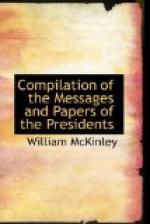Nothing has since occurred to change my view in this regard, and I recognize as fully now as then that the issuance of a proclamation of neutrality, by which process the so-called recognition of belligerents is published, could of itself and unattended by other action accomplish nothing toward the one end for which we labor—the instant pacification of Cuba and the cessation of the misery that afflicts the island.
Turning to the question of recognizing at this time the independence of the present insurgent government in Cuba, we find safe precedents in our history from an early day. They are well summed up in President Jackson’s message to Congress, December 21, 1836, on the subject of the recognition of the independence of Texas. He said:
In all the contests that have arisen out of the revolutions of France, out of the disputes relating to the crowns of Portugal and Spain, out of the revolutionary movements of those Kingdoms, out of the separation of the American possessions of both from the European Governments, and out of the numerous and constantly occurring struggles for dominion in Spanish America, so wisely consistent with our just principles has been the action of our Government that we have under the most critical circumstances avoided all censure and encountered no other evil than that produced by a transient estrangement of good will in those against whom we have been by force of evidence compelled to decide.
It has thus been made known to the world that the uniform policy and practice of the United States is to avoid all interference in disputes which merely relate to the internal government of other nations, and eventually to recognize the authority of the prevailing party, without reference to our particular interests and views or to the merits of the original controversy.
* * * * *
* * * But on this as on every trying
occasion safety is to be found in
a rigid adherence to principle.




